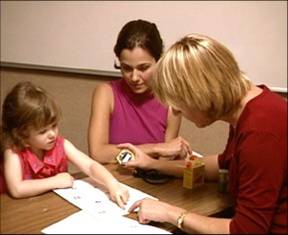What the Individuals with Disabilities Education Act Means For You
The Individuals with Disabilities Education Act (IDEA) was signed into law in 1990. It was intended to ensure that all children with a qualifying disability have access to a free, appropriate public education (FAPE). That means that it provides for special education services within the public school system. If your child qualifies under the IDEA, his school must tailor an education program that meets his specific needs.
Eligibility Criteria
To be eligible for speech therapy in the public school system under the IDEA, your child must meet the federal definition of a “child with a disability.” While this definition appears quite vague, essentially it means that your child must be diagnosed with a speech-language impairment that adversely affects his access to an education.
Whether a child is considered disabled under the IDEA will be determined by a team of professionals, including but not limited to the child’s physician, his parents, a psychologist, and a speech-language pathologist (SLP). This interdisciplinary committee will review all available information about the child, including hearing assessments, schoolwork, language samples, teacher observations, etc. The child’s parents have the right to refuse a speech-language evaluation if they do not wish him to receive special education through the schools.
Early Intervention
If your child is under the age of three, he may qualify for help under the IDEA even though he may not be in school. This is called early intervention (EI). Early intervention is handled by the states and the program is called different names depending on where you live. For example, in Georgia it’s called Babies Can’t Wait and in Indiana it’s called First Steps.
If you suspect your child needs help, call any school in your area and request the name of the appropriate agency in your state for the early intervention program. The National Dissemination Center for Children with Disabilities also offers contact information for programs in each state.
After you contact the appropriate early intervention agency, you will likely be directed to a family service coordinator. This person will ask you questions regarding your child’s possible communication problem. She will give you a referral for an evaluation if it’s possible that your child qualifies for help under the IDEA.
Special Education
If your child is older than three, he may qualify for help under the special education process, rather than the early intervention program. The IDEA supports Child Find, which is a mandate that requires states to identify and evaluate all children that may have a disability. Your child’s teacher may request an evaluation or you can do so by contacting his school.
Your child will be evaluated by a team of professionals. If he is found eligible under the IDEA, an Individualized Education Program (IEP) meeting will be held to determine his education plan, or IEP. Your child’s IEP is much like a treatment plan that a private speech therapist would write. It states how often he has access to speech therapy sessions, what services he will receive, whether he will participate in standardized tests, and how his progress will be measured. You have the right to review your child’s speech therapy goals, which are written into the IEP, as well as receive regular progress reports.





